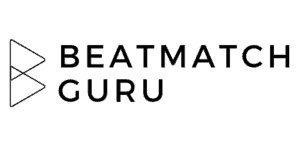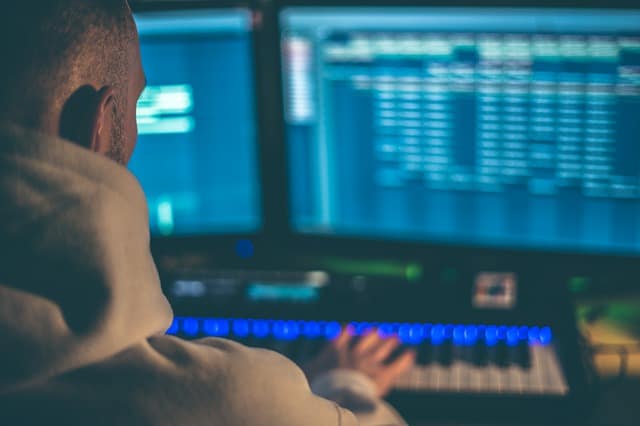
Becoming a DJ producer is arguably one of the most amazing jobs, career or life path. However you want to define it, flying around the world playing DJ gigs and festivals, producing music with artists, sounds fantastic right? It is, however what you don’t see is the tremendous amount of hard work, endurance and business knowledge and experience that is repeatable for success.
How to become a DJ Producer?
To become a DJ Producer certain skills, equipment, experience and business acumen are required. Buying music equipment and software allows music to be mixed and created. Learning how to DJ and create music allows for an advanced level of knowledge to be creative musically. Promoting and marketing your music is then required to expose your music to an audience.
This guide is perfect if you’re a newbie to DJing and music production. I’ve put together a map in logical order to give you some basic knowledge and a path to reach success. There’s a lot of resources for you to research yourself in terms of knowledge gaining about equipment, software, tutorials and courses etc.
Enjoy this resource, and good luck on your journey to becoming a DJ Producer.
Success Story: JAMES HYPE
Story from the beginning
He became obsessed by music and different genres from an early age. His first few DJ gigs were at a local bar in his hometown in the north of England (Liverpool) on a Tuesday night of all nights. There he focused on DJing purely house music.
From there James Hype became much better with experience and then started DJing at student union nights. He decided to sack off DJing purely house music all night long and diversified to all genres. This is great because in my opinion James is tailoring his DJ sets to his audience.
So James Hype’s DJ experience led him to progress onto music production.
How James Hype made it
Producing music started for James Hype when he focused on creating bootlegs and remixes to add into his DJ sets.
His first bootleg was of Hotline Bling. From there, record labels started to contact James requesting official remixes to release. This is when James Hype started making some money and since then he’s started to play big arenas in the UK playing his own tracks.
James then started to make his own tracks from scratch and confesses that it’s a whole new process of music production compared to bootlegs and remixes. You’re essentially working from a blank canvas.
Eventually James started to work with Craig David. Working with Craig David then started to help get him even more notice as a DJ producer and artist and release more tracks.
Now you can see that with the effort, skill and practice you can make it too as a DJ producer.
Some DJ Producers start out as a DJ and then turn to music production similar to James Hype, some start out as Musicians like Fatboy Slim and others start as music producers such as Nu:Tone.
Watch the video below to draw upon some inspiration before I take you through the beginners guide on “How to Become a Successful DJ Producer“.
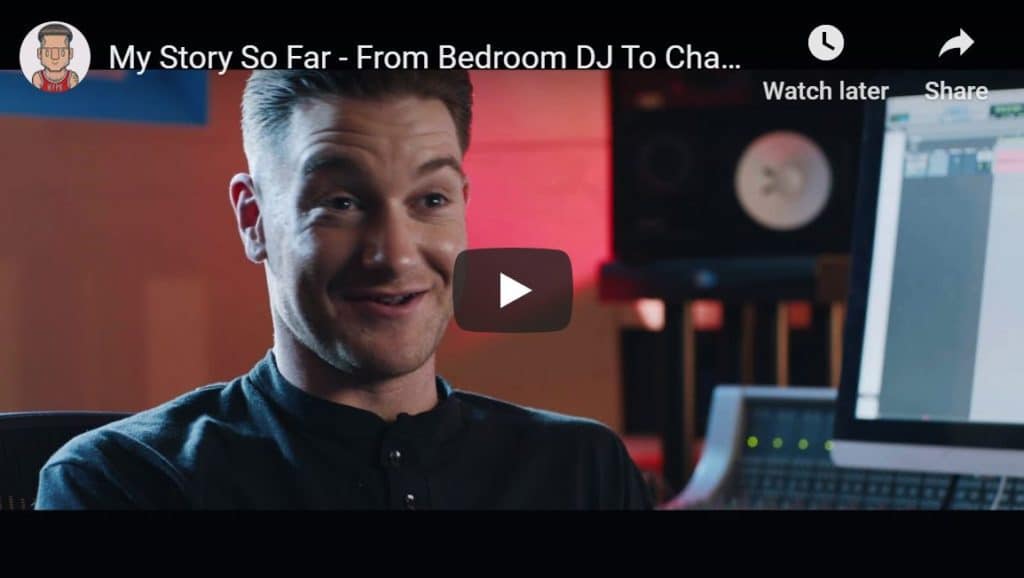
1. Education & Learning
Music Theory
Music theory provides us all a grounding of knowledge that allows our creativeness to be poured into context to sound amazing. The wonderful thing about music theory is that it can be adapted to both music production and DJing. Music production for helping with aspects such as chord progressions and DJing for harmonic mixing.
Here’s a list of the top level areas that you can expect to learn within music theory.
- Time signatures
- Key signatures
- Bars & Phrases
- Song structure
- Harmony
- Chord progressions
- Notation
- Scales
- Melody
- Rhythm
- Pitch
Why is Music Theory Important?
Music theory will give you a head start in your music production quality, depth and swiftness of creating music. A foundation of knowledge is given to you allowing for understand basic aspects such as musical structure and composition.
Ultimately music theory gives you a solid knowledge of music to provide a richer experience for listeners.
How do I Start Learning Music Theory?
The internet is wonderful thing and provides us with a wealth of knowledge. YouTube, Reddit and music course websites, to mention a few, certainly can give you the music theory knowledge that you require.
Here’s a list of resources to start getting to grips with music theory as a music producer and few ideas for becoming a DJ too.
YouTube Music theory learning resources include:
Andrew Huang has an interesting YouTube channel to get you kick started with learning music theory and other areas of music production too.
See the below video for a really great intro to music theory in half an hour.
Michael New has a great YouTube channel that I’ve learnt a lot from in terms of music theory. There are some great videos within the below play list that break down each topic logically including basic chords, major and minor keys, circle of fifths and how to change key. The video that helped me most is the ‘Minor Scales‘ video as I like to produce music in this key.
Watch ‘How basic chords work‘ here.
If you have an hour spare the Tomas George is your man. Watch this video to get the complete full works when it comes to music theory, specifically useful for electronic music producers. It’s a great video for producers using music production software as Tomas takes you through how to capture chords in midi format on the DAW (Digital Audio Workstation).
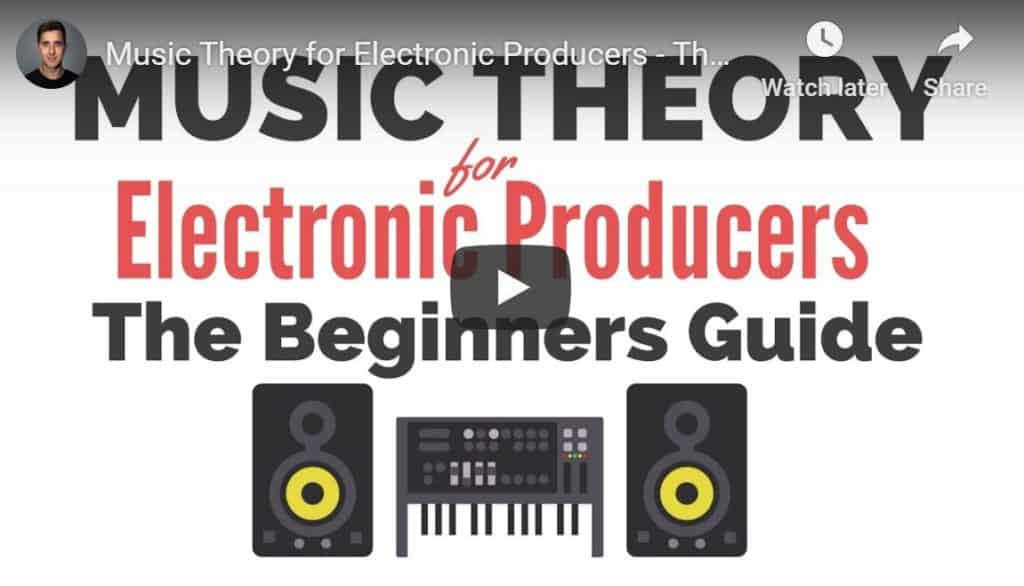
Learn Music Production
Using DAWs
What is a DAW?
A DAW is a Digital Audio Workstation that allows you to put all your creative ideas onto a timeline split out by channels. Each channel allows you to add various sounds and instruments. You can play a midi keyboard or record live audio onto a DAW and once recorded it’s possible to edit the midi notes and audio waves.
Once you’ve created a the structure of a track that you’re working on, you can move onto mixing and mastering, this process is considered the ‘post-production’ phase.
Mixing
What is mixing audio?
Multiple effects and modulation can be added once the the audio and midi notes are recorded onto the DAW. The aim is to take away any clashes in sound, smooth volume of certain sounds, make grooves sound more solid and punchy e.g. kick drums to stand out more in the mix by adjusting EQ.
This process is known as “mixing”, which is the process of making the creativeness that you’ve captured to sound tight and well balanced to the listeners ears.
To achieve a great mix you can use various tools and effects in most DAWs which include:
- EQ
- Reverb
- Panning (Left / Right)
- Echo
- Compression
- Side-Chain compression
- Audio clipping
- Distortion
NOTE: Mixing becomes first before mastering in the post production process.
Once the mixing process has been completed, you can export your audio file as one track, also known as a stereo mixdown, and start the mastering process.
Mastering
What is mastering audio?
The final step to work on in the music production process is ‘mastering‘.
The aim is to allow for all elements within an audio track to be balanced and cohesive in sound quality. It’s really important that this step is worked on as consistency of sound quality can be achieved before distribution, pressing to vinyl and playing out via radio, live speakers etc.
A great service that I’ve found useful if you need help to master your tracks is a website called Landr. See here for their website.
Learning resource for Mixing and Mastering
SAE Institute Online Course
If you’ve got some money and are super invested in getting some formal training then I highly suggest working with SAE.
I’ve taken a mixing course online with SAE and had a great tutor called Hans-Martin, he is a professional engineer in the music industry and has mastered tracks for David Bowe. Say no more! I learn’t a lot from his course and I’m sure you will too.
YouTube videos I really like for mixing and mastering music, watch here:
- Mixing Tutorial Presentation at Point Blank. Video here: Mixing your track for the club.
- Mastering Tutorial on YouTube by ‘In The Mix‘ YouTube channel: How to Master your music in 5 simple steps.
Learn DJing Skills
Counting beats, bars & phrases
Hopefully you’ve already encountered what bars and phrases are by up-skilling yourself with a bit of music theory. In case you haven’t, here’s a quick definition of what both bars and phrases are.
What are bars in music?
Bars are segments in music which contain a certain amount of beats. The quantity of beats per bar is determined by the time signature in which the song is written. Time signature 4/4, which means there’s 4 beats to a bar, is the most common and popular time signature to write music in. 4/4 is typical of most popular and electronic music.
What are phrases in music?
Phrases are typically made up of several bars combined together to make a section of a song. Phrases can contain different melodies and rhythms of a song and quite distinct from each other.
A lot of DJs use phrases to know when to cue and start mixing in another track. If you can phrase match tracks together then your DJ mixes between tracks will sound tight and seamless, without any clashing sounds such as vocals of both tracks in the mix.
Read more here about beats, bars and phrases. I’ve written a more in-depth explanation to help you understand this topic in more detail.
So why is this important? Well, this is the best starting point to help you with your DJing. If you’re already into music production and have good rhythm there’s a good chance this will come easy to you. If this is the case then you’re already one step ahead of the game.
Beat Matching by Ear
The next ingredient to progress your foundational DJing skills is beat matching, more specifically beat matching by ear.
Many DJs now have the option to listen to the beat and also to see the beats visually on a digital screen. Beats on a screen do not necessarily help beginner DJs out because there may come a time that there’s not digital screen displaying beats to match up. Also sometimes using your ears to match beats together can potentially sound better.
Beat matching tips to practice:
- Practice beat matching by ear and cover up the digital display on your laptop, DJ controller or CDJs.
- Pick two tracks that you know inside out and that are simplistic in beat.
- Record yourself mixing the two tracks together and listen back to the recording.
- Critique your own mixing, get feedback from friends too, be honest with yourself and figure out at what part of the mix was too slow or too fast.
- Practice, practice, practice. (The recording part is really helpful to listen back and get real feedback).
EQ Transitions in the Mix
Ok, so now you can count beats, match phrases together in sync. Now it’s time to learn how to improve your mix transition skills.
EQing is a great tool on the DJ mixer that can help you transition between two tracks even more smoothly than simply switching the crossfader from track A to B.
EQing can help you take control of taking away high, mid and low frequencies. A popular method among electronic music DJs is to cut out the low allowing the bassline of a new track in the mix to take over and appear through the mix for listeners to enjoy.
This is a simple and effective technique that can learnt very quickly. Just don’t be too heavy handed with the EQ buttons on the mixer and break them like I’ve done many a time back in the day. 🙂
Read my article here on ‘11 Tips for Using EQ Effectively on a Mixer‘ for more advice.
BONUS Tips too! Watch my advice on how to not redline the mixer too.
Creative Mixes with Hot Cues & Loops
DJ controllers allow DJs to capitalise on the use of hot cues and loops. The buttons are a great feature to give DJs the opportunity to be more creative and have fun mixing tracks together.
Hot cues allow DJs to start at various points throughout a track. From my experience this is so much more efficient and saves time trying to get to a point of a track that you want to start mixing from. It gives you the ability to start mixing a track very quickly.
Hot cues also allow you to be creative by playing the hot cues them selves as a sort of beat pad. You can achieve this by setting each hot cue at various points of a melody or vocal section. Once set, you can then play your own sound using the hot cues like a beat pad sampler. Cool huh!
Loops are a great way to build up tension of a track. Once you’ve captured a loop say for 4 bars, you can then reduce the bars down to 2, then 1, then half a bar. This can create so great build up sounds to then transition to another track or simply continue play the same track. Used effectively, looping can really get the crowd going.
Recording DJ Mixes
As mentioned above, recording DJ mixes are really helpful for a couple of reasons. Firstly recorded mixes allow you to analyse your mixes, especially handy if you’ve just started putting together a mix of 30 to 60 minutes. Getting feedback of your mixes can really help learn where you might of gone wrong and do better next time. Frustrating process, but effective in the long term.
Recording mixes is essential to allow you to share you mixes and get some brand awareness of yourself as a DJ. Sharing on social media and platforms similar to YouTube and Mixcloud can help your share your mixes online really easily.
I’ve put together a quick tutorial on how to record a mix using Ableton, hope this helps you get setup to record your mixes quickly.
2. Tools to Do Your Job
Music Production Equipment & Software
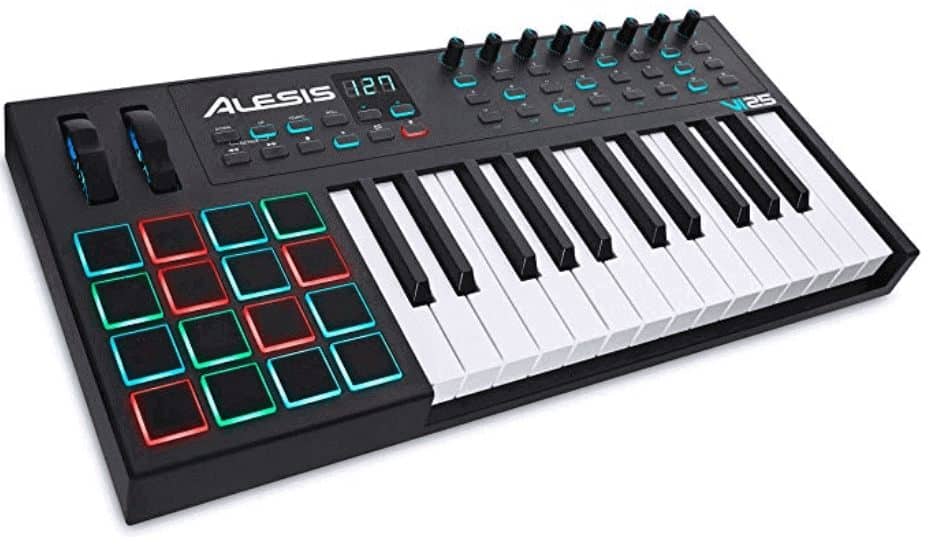
Music production can be easy to setup for beginners and fairly inexpensive too. The most expensive equipment I’d say is worth investing in is a high spec laptop. I’ve always used a MacBook because of the reliability, but I know some music producers use a desktop PC which are a lot cheaper than MacBooks.
Here’s your beginners music production checklist:
- Laptop / Desktop Computer (MacBook Pro)
- Midi keyboard (Samson Keyboard)
- Sound card (Apogee One)
- USB cables
- Pre-amp speakers (Yamaha HS5)
- DAW Software (Ableton)
As a beginner I started out with a midi keyboard controller by Yamaha. This is simply a basic keyboard with around 4 to 5 octaves, but was enough to allow me to start inputting midi notes into music production software and start making music.
Technology has advanced a lot and we genuinely spoilt for choice. There’s a new midi keyboard that I’ve seen recently that I feel would be great for a beginner because it has a beatpad and keyboard. This is a great combo and saves having to buy two separate bits of kit.
The Alesis VI25 is on Amazon for about £125. Although if you’re on a really tight budget then opt for a cheaper midi keyboard for about £40 from Miditech.
All the equipment that I currently used I’ve linked to above so you can get a flavour for how much the equipment costs and its capabilities. All the equipment I’ve purchased has stood the test of time and has not broken on me yet.
Examples of DAWs I’d recommend
I’d recommend at the very beginning starting out with a basic music production software if you haven’t learnt anything about DAWs. In some software there is a lot going on so I’ve listen the below software in order of complexity, easy to complex:
I’ve used all of these different DAW softwares and can safely saw I’m most impressed with Ableton. It has an amazing simplicity about it and the workflow is definitely the best of this bunch. I can’t knock Reason, I used it for ages, the feature for the drums is the Dr Rex drum rack, brilliant for breaks.
My advice is to purchase software direct from the software company websites. There are deals throughout the year for getting cheaper software and also you know the software is legit too.
Now you’ve got all your equipment and software for music production, it’s not time to sort out DJing equipment.
DJ Equipment & Software
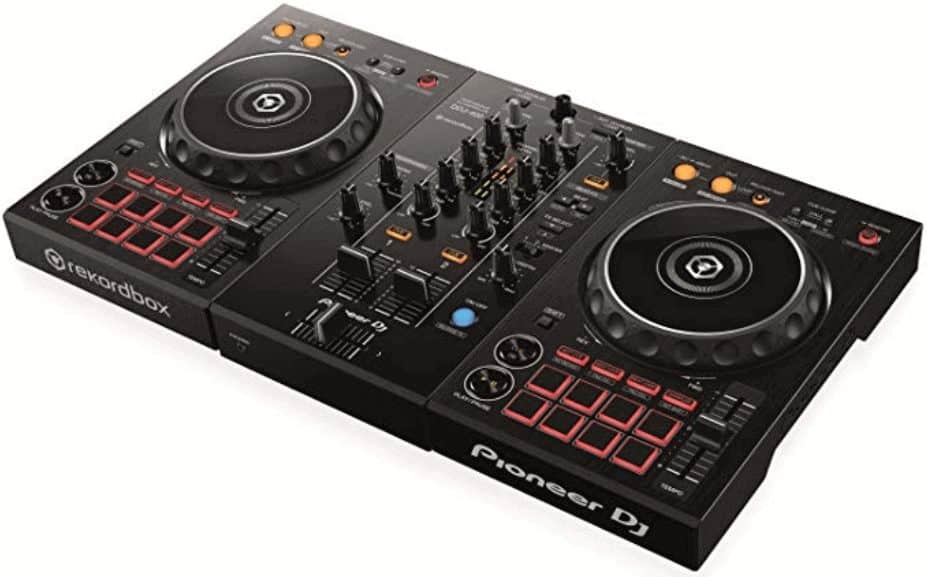
As a beginner DJ now days, I’d suggest getting a DJ controller. Cheap but the value they provide is amazing.
Some DJ Controllers are really responsive on the turntable jog wheels which is great if you end up playing in a club on CDJs. There’s a Cue and Play button on a lot of DJ controllers too, which is to help mimic CDJs also.
I’ve tried and tested DJ controllers from Native Instruments but I found the Pioneer to be the most easy controller to get on with.
Pioneer offer some great products and I’m very pleased with the Pioneer DDJ-400 controller. If you’re on a budget, I’d recommend considering a cheaper version and that is the DDJ-200.
DJ Software usually comes along with the DJ controller package, so that’s why I’m advising to get a DJ controller.
Rekordbox is the software that I use with the DDJ-400. In the past I’ve used Serato and I love Serato but Rekordbox has blown me away with all the extra information and features like suggested songs in the same key for example.
3. Creative Process
Practice
In order to get good at anything in life, especially music, then you need to practice. Consistent and habitual practice on a daily basis is going to get you to where you need to be. And that is to become a DJ and producer of music.
This is one of the quotes that I think about on a daily basis, and it really helps remind me that in order to achieve I need to be persistent on a daily basis. Hopefully you can use this quote to remind you too.
“Dripping water hollows out stone, not through force but through persistence.”
― Ovid
Continuous learning
If you’ve followed my advice up until this point then you will certainly of built up a great deal of foundational knowledge.
At this stage it can be frustrating as you’ve learnt so much but might feel limited. From experience I’ve felt frustrated due to hitting road blocks in the quality in my music production and certain DJing skills.
The solution: Have an attitude of continuous learning.
Non-perfection & quantity of production
I’ve spoke directly on forums with other music producers and their advice when starting out creating music is to focus on quantity of music creation. I fell into the “perfection” trap and it really held back the amount of music that I created in total.
Don’t get me wrong, getting the skill level up to an intermediate and expert level really helps with swiftness and quantity of production. You have to focus on getting a track done, finished and ready for mastering.
There’s always a few tweaks that you will want to go back to and try to smooth out. In doing so you’ll spend too much on a track that is already amazing.
Record DJ mixes
In terms of the DJing, the creative process is best captured by recording your DJ sets. I’ve already given you some great advice to get going and start recording mixes in this article.
Now it’s time to polish of those mixes to a high level and get ready for releasing and sharing mixes online. Recording mixes can also be done in the form of a podcast, a live set to be put onto YouTube and finally going live on Facebook which seems popular.
All of these activities link in well with the business and marketing activities in the next section.
DJ out live
To further build up your skill level and confidence in DJing, my advice is to DJ live in front of an audience. At the beginning you could DJ a small house party and then build it up from there to say a local bar or club.
Another format you could try DJing live is on radio. I’ve found that DJing on a radio station in the local area or on an online radio show really helps. Fair enough you’re not DJing in front of an audience in front of you, but there are listeners and the pressure is the same.
Trust me, it’s really good to practice getting good under pressure and performing to a high level. Especially if technical challenges arise, you can get some great experience in resolving those issues.
Get Feedback (and Learn From It)
Finally, in the creative process it’s always great to get feedback. Some people are honest and some people will be polite. Take all feedback on board and put that continuous learning to good use.
If people don’t like your music production or DJ mixes for some reason or another e.g. quality of sound or lacking of beat matching, then you need to know. Get better, progress and smash it. Push forward and become better.
4. Business & Marketing Process
Brand & Name
Pick a DJ Producer name and stick to it. Changing your name all the time is not going to do you any favours, you’re simply delaying the impact of your success.
TIP: This article by VICE is really helpful to give you some inspiration on DJ Producer names.
Some of the top tips about the DJ Producer names that VICE give are:
- Real Name e.g. Steve Angello
- Oxymoron e.g. Fatboy Slim
- Mythical Creature e.g. Daedulus
- Background Story e.g. DeadMau5
Creating a brand, more to the point, a logo will help and compliment your other marketing work. Also adding your brand logo to a flyer will help stand out and be recognised by people that know and follow you.
Mixcloud / Soundcloud / YouTube
Building up a great portfolio of tracks and mixes is great for future investment. It’s highly likely at the beginning that the amount of views and listens to your audio is low.
Very low in fact. Once you start playing live in clubs, bars, radio shows etc, this is when all the audio content you’ve uploaded is really helpful as people that like your music will likely search for your tracks and mixes.
Get creating music and mixes, and get uploading them on a consistently daily and weekly basis. It will be worth it in the long run.
It’s worth noting that you can record your own podcast show and host it on Soundcloud. There are some great DJs that have podcasts online and its a really great format to showcase your personality and build a following.
Website
Create a website. This is fully in your control and I’ve regularly checked out other DJ websites. I really like Bonobomusic.com, it’s simplistic in design but stylish and links to all the essential information that a fan and follower would need.
- Tour dates
- Shop
- Social media outlets
- Latest releases
Check out some websites of DJ producers that you really like and draw upon some inspiration. Some DJs even write a blog to help inspire other artists with advice which is always good to share on your website too.
Music selling platforms (CDBaby / Beatstar)
If you’ve got to a point now where there’s a massive catalogue of music on your hard drive, then it could be time to start selling your beats online.
You can make money by selling your music through distribution platforms such as CDBaby. This is a great service to distribute and promote your music. Later down the line you can use this service to sell your own vinyls and CDs if that still a thing in 2020 🙂
Another way if you want to license some of your beats to make some extra money then Beatstars is a good website to achieve that. You can also license your music on CDBaby too.
How to Stand out from the crowd?
Be known for something as a DJ. Here are some examples:
- DeadMau5 = Mouse face mask
- Fatboy Slim = Hawaiian shirt
- Marshmello = Marshmello face mask
- Steve Aoki = Hair style
- Skrillex = Hair style
You get the idea. So the challenge that I bring to you is to think of something that you could wear or style yourself a certain way that people will remember you by.
5. Live Performance
DJing at Gigs
The final string to your bow is to play live gigs. And when I say live gigs, I mean anything you can play then go ahead and play there. DJing gives you a great format to showcase your technical skills as a DJ and show off your own music production live to an audience.
The feedback you can get from a live audience is very telling and you will certainly be able to see which of your tracks work well to get a crowd reaction. You’ll find a mega boost in confidence and will allow you to overcome performance nerves over many a DJ gig played.
See my article about how to reduce performance nerves here for more information.
Local bars and clubs are a great way to start, but note that it’s important to build up some sort of following online to help sway promoters decisions to put you on their line up.
Build up your following and get researching gigs to play and start contacting clubs and bars you want to play.
Band to support your tracks live e.g. Bonobo, London Elektricity
If you’re from a musical background then you could also consider getting together a band to play your music creations together.
Bonobo as done this live on radio with the video and audio recording being shared on YouTube. Such a great thing to see music come to life after an already great track recorded. Watch the live performance below in the YouTube video.
London Elekricity is a Drum and Bass producing and runs Hospital Records, a prominent and very popular record label in the genre.
He’s a great musician, music producer and also DJs amazing sets usually harmonic mixing is his style of DJing. Below I’ve put together a clip of the London Elektricity Big Band playing live a few years ago at Finsbury Park, London. Draw upon some inspiration from this live track on the YouTube video, this could be you and your band one day. Oh yeah!
Check out video on YouTube Here.
6. Continuous Process (of Improvement)
When I say “continuous process” I mean and process of improvement, creation and marketing to help drive you towards you goal of becoming a successful DJ producer.
In the business section on Amazon there’s a book that talks about “Turning the Flywheel“. The concept is simple, there’s a process to follow certain steps to help you achieve greatness. There’s a great example in the book about how Amazon got to the size and success it is to this day.
In the flywheel each step of the process compliments each other and the more the flywheel turns the outcome of each multiplies in effect. You might know this as the snow ball effect, it’s the same thing.
So if you follow my advice and go with a similar process to the below flywheel then you’ll more than likely achieve greatness within. Of course you can create and adapt your own flywheel to success.
- Learn
- Create
- Get feedback
- Promote
- Perform
Checklist
As a final point, here’s a checklist of the top line topics covered in this guide. There’s a lot to go through to get you to the beginnings of your career as a successful DJ producer. I wish you all the luck in the world in your journey.
- Education – music theory, DJing skills
- Equipment – for music production and DJing
- Create – mixes, music, beats
- Business – Marketing & Promotion
- Live Performance – in clubs, radio, podcasts
- Continuous Process – learn, create & promote REPEAT
Related Questions
How much do DJs get paid?
DJs can earn around £50 to £150 for DJ sets in small bars and nightclubs with a low level amount of experience. DJs with experience can earn around £150 to £2,000 DJing in a club per set. DJs that are superstars can make anywhere from £30,000 per year to a six figure yearly income.
How do music producers get paid?
Music producers can get paid in a variety of ways including upfront fees to produce music, publishing royalties, production points and beat leasing.
How much should a producer charge for a beat?
Beat selling platforms and websites offer music beats for around $10 to $50. It is possible to sell music beats for a higher cost for example $500 if selling to a specific audience and music genre.
How do I copyright a song?
As soon as a song is written down or recorded, copyright is automatically applied. There is no process or no application required to copyright music in the UK. In the USA there is an application process to copyright music at a fee.
